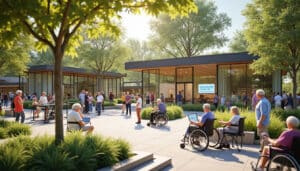Non-drug therapies represent an innovative and complementary approach to healthcare. They are distinguished by their ability to improve patients’ well-being without resorting to medications. These interventions encompass a multitude of methods ranging from physical activities to psychological techniques, aimed at treating and alleviating various symptoms. Understanding the issues related to these therapies is essential, as they offer tailored solutions for diverse conditions, particularly for elderly individuals or those suffering from chronic illnesses. This exploration of the benefits and applications of these therapies highlights their growing place in the current medical landscape.
Non-drug therapies comprise a set of interventions that aim to improve the health and well-being of patients without resorting to medication. They represent a holistic approach to the care of individuals, emphasizing their quality of life rather than merely suppressing symptoms. These methods can include various practices such as physical exercise, psychological therapies, and other rehabilitative interventions.
One of the essential characteristics of non-drug therapies is their foundation on scientific data and rigorous evaluation. The interventions are designed to be non-invasive, meaning they do not require the use of surgical procedures or complex medical instruments. Instead, they promote the active participation of patients in their own care, which strengthens their autonomy and commitment to the healing process.
The main types of non-drug therapies include various techniques, such as hygienic-dietary guidelines, which encompass modifications to eating habits, physical activity, and general hygiene. These approaches are often recommended for chronic diseases, such as diabetes or cardiovascular diseases, where lifestyle plays a crucial role in managing health status.
Another important aspect of non-drug therapies is their ability to develop psychological treatments. These approaches, particularly cognitive-behavioral therapies, aim to modify dysfunctional thought patterns and behaviors. They are particularly effective for treating disorders such as anxiety, depression, or sleep disturbances, while avoiding the systematic use of antidepressants.
Physical therapies also play a fundamental role in the framework of non-drug therapies. Techniques such as physiotherapy, occupational therapy, and psychomotricity aim to improve the mobility and physical functioning of patients, which is even more crucial for elderly individuals or those with disabilities. These interventions help preserve or restore essential capabilities, thereby promoting autonomy.
The benefits of non-drug therapies are numerous. They can contribute to improving the quality of life of patients by reducing the intensity of symptoms, strengthening social connections, and promoting psychological well-being. Furthermore, they are often perceived as less stigmatizing than medical treatments, which can encourage more patients to seek them out.
Despite their effectiveness, the use of non-drug therapies presents certain challenges. The lack of specialized training for healthcare professionals and the lack of patient awareness are common barriers to their adoption. Moreover, some doctors may feel pressured to prescribe medications due to patient expectations, which can limit the integration of non-drug interventions into daily practice.
Finally, the evaluation of outcomes and the systematic integration of these therapies into care pathways are crucial issues. The establishment of rigorous protocols will validate their effectiveness and ensure equitable access for all patients, regardless of their geographical situation, while promoting health and well-being in a comprehensive manner.

FAQ about Non-Drug Therapy
What do we mean by non-drug therapy? Non-drug therapies are healthcare interventions that do not rely on the use of medications. They can include practices such as physical exercise, improving sleep, dietary habits, and psychosocial therapies, among others.
What are the benefits of non-drug therapies for the elderly? Non-drug therapies, such as art therapy and psychotherapy, have shown beneficial effects on the quality of life of elderly individuals, notably by improving social interactions, mood, and reducing psychological symptoms.
What is the difference between a non-pharmacological therapeutic intervention and a medication treatment? A non-pharmacological therapeutic intervention encompasses all forms of healthcare that do not involve the use of medications. This can include methods such as behavioral and cognitive therapies, meditation, and other forms of alternative therapies that do not require medications.
In what cases are non-pharmacological treatments used? While medication treatments are sometimes essential and even vital, non-pharmacological treatments are used when possible to complement or replace medications, often to minimize side effects or improve the patients’ quality of life.











